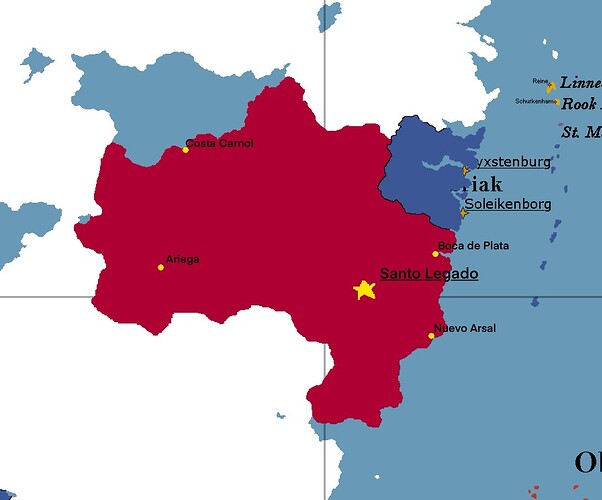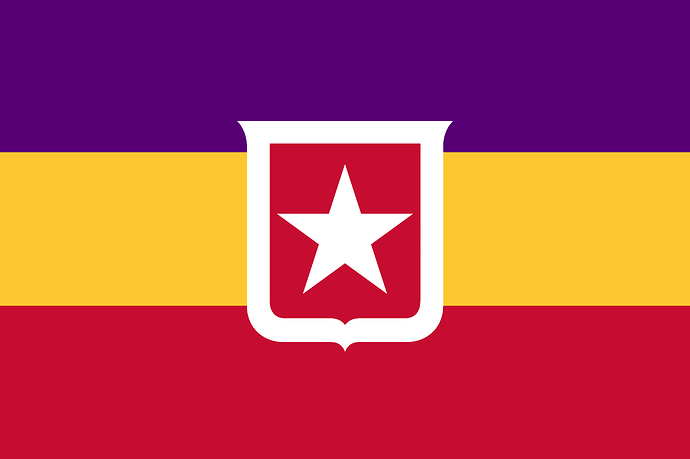New Map: 158,128 pixels
(Costa Carnol, Boca de Plata, and Nuevo Arsal are all unchanged, major differences are that the capital Santo Legado is moved slightly and there is a new city furthest to the left named Ariega)
Flag:
Nation Name (long): National Republic of Chiol (República Nacional de Chiol)
Nation Name (short): Chiol
Population: 82.24 million
Total GDP: 502.37 billion
GDP per Capita: 6,108.61
Currency: Chiolan Seral (Seral Chiolano) (Ꞩ)
Demonym: Chiolan (Chiolano)
Language: Impelanzan
Species: Human
Religion: Tunseism
Capital: Santo Legado
Largest City: Santo Legado
Government Type: Unitary Parliamentary Republic under a One Party Dictatorship
Leader(s):
Prime Minister and Secretary-General Eila Dolezal
Legislature:
De Jure: Chiolan Parliament (Parlamento de Chiol)
De Facto: Estelarianist Party Congress (Congreso del Partido Estelarista)
Two-Letter Code: CH
Three-Letter Code: CHI
Motto: Para Partido y El Legado
National Anthem: Brindis por la Grandeza
National Animal(s): Secretary Bird
National Plant: Carnation
Historical Summary:
In the year _____, the Viceroyalty of Chiol was established as a Peragian Colony as an extension of its influence from the Oblivion Islands. The new settlers spread across the Gondwanan coast, most notably founding the cities of Boca de Plata and Nuevo Arsal. As the colony grew, it began expanding its cultural and political influence, primarily by establishing Tunseism as its official religion and encouraging inland expansion by settlers.
In 1730, several Peragian colonies, including Chiol, split from the empire as Peragen began focusing on internal matters. Administration in the new Kingdom of Chiol remained largely the same from its colonial era, with important elites and political officials from the Viceroyalty simply being given a new title and remaining in power. The most notable political change was the capital changing from Boca de Plata to Santo Legado. As ownership of the Oblivion Islands transferred from Peragen to Morstaybishlia, fears within the Kingdom of another possible colonization attempt began to arise. In response to this, the Kingdom allied itself with Norgsveldet and neighboring states to try and solidify its position as a sovereign nation. Over the course of the Kingdom, several monarchs attempted to continue the political expansions carried out by earlier Viceroys, with some being successful and others not so much. Aside from the tumultuous frontiers, the Kingdom of Chiol remained relatively peaceful and prosperous until the Great War.
Chiol did not officially take part in the Great War, but it did have a big effect on the country. A long time ally of the Kingdom, Norgsveldet, was allied with Morstaybishlia and the other Imperial Powers. Many Chiolans saw this as a betrayal and attempted to pressure the then-King Biserca II to enter Chiol into the war, which he ultimately did not. Following a series of protests and political unrest in early 1918, Biserca II chose to cut back substantially on his own power and establish the Chiolan Parliament, making the country officially a Constitutional Monarchy.
The early Chiolan Parliament was relatively stable and worked well in fixing the economic woes of the country following the collateral economic damage from Great War. The country began to develop its infrastructure, particularly in areas neglected by the Kingdom, such as the Chiolan Interior and around Costa Carnol. Around 1946, the Chiolan economy began to stagnate, with the primary reason being inter party conflict within parliament rendering it unable to reliably form a government for more than a year. As a consequence, more radical parties began to gain seats in parliament.
In 1952, the Estelarianist Party of Chiol was formed by Sonya Zore, inspired off of the ideology created by Cornelio Estelárez. The Party started off small, but quickly began to gain traction among the disgruntled young of Chiol, who often viewed Chiol’s other parties as ineffectual and corrupt. Through Zore’s emphatic speeches, the Party’s popularity grew. Between 1952 and 1958, supporters of the Estelarianist Party increasingly began to use violence to intimidate voters into supporting Zore and formed a cult of personality around him. National fervor surrounding Zore reached a fever pitch in 1958, whose election foresaw the Estelarianists win with a majority of the votes. Zore’s first and second terms oversaw some of the most drastic political changes in Chiolan history with the official dissolution of the Monarchy and the proclamation of the National Republic of Chiol. While in his first term, Zore tampered with Chiol’s electoral processes as well. The 1964 election as a result is largely considered fraudulent, coming out overwhelmingly in favor of the Estelarianists. Thus, 1964 is often the date considered to be when Chiol officially transitioned from a Republic into a Dictatorship. Political opponents of Zore, both civilians and politicians, marched on the streets of Santo Legado in protest. The protests were shut down with military force, and Zore used them as an excuse to jail or execute political opponents. Additionally, Zore banned other political parties from participating in elections, establishing the Estelarianist Party as the only one allowed. Over the course of Zore’s reign, he was often regarded as the country’s “savior” domestically, particularly with the Party’s control of media and the image they presented of themselves and their leader. But Internationally, Zore’s regime was nearly universally denounced as explicitly anti-democratic and authoritarian.
Sonya Zore died in 1988 and was succeeded by his Assistant Secretary Renata Dorina. Dorina, and most subsequent Secretary-Generals of the Party were not as powerful as Zore, with the Estelarianist Party itself adopting a more powerful role in decision making, often through party congresses where legislative matters were discussed. Dorina is most well known for establishing party organs like the Congress, as well as shifting the party’s ideology away from Zore’s isolationism in order to try and promote growth. As a result, many aspects of the party were toned down in comparison to the Zore era, although the National Republic for the most part remains a pariah on the world stage. Following Dorina’s death in 2002, Silvana Sierra was appointed as Secretary-General by the Party Congress, making him the first post-Zore Secretary-General to be appointed rather than just assuming the position. Around this time, the popularity of the party began to wane due to a large variety of factors. In response, many newcomer politicians to the Party began adopting similar populist strategies as Zore did in the 50s, the most successful of which being Eila Dolezal, who began his career as a low ranking party member in 2020. Over the course of several years, Dolezal was poised to become the next Secretary-General, despite insistence by Sierra not to appoint him. Following Sierra’s resignation in early late 2024, Eila Dolezal officially became Secretary-General after being appointed by the Party Congress.

